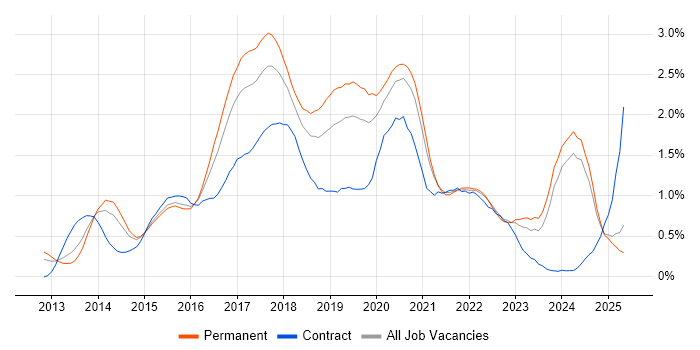MongoDB
England > East Midlands
The table below provides summary statistics and salary benchmarking for jobs advertised in the East Midlands requiring MongoDB skills. It covers permanent job vacancies from the 6 months leading up to 4 January 2026, with comparisons to the same periods in the previous two years.
| 6 months to 4 Jan 2026 |
Same period 2025 | Same period 2024 | |
|---|---|---|---|
| Rank | 132 | 114 | 107 |
| Rank change year-on-year | -18 | -7 | +38 |
| Permanent jobs citing MongoDB | 1 | 19 | 12 |
| As % of all permanent jobs in the East Midlands | 0.040% | 0.84% | 0.70% |
| As % of the Database & Business Intelligence category | 0.43% | 6.03% | 3.02% |
| Number of salaries quoted | 1 | 12 | 12 |
| 10th Percentile | - | £43,875 | £48,875 |
| 25th Percentile | £52,500 | £56,250 | £50,000 |
| Median annual salary (50th Percentile) | £55,000 | £63,750 | £65,000 |
| Median % change year-on-year | -13.73% | -1.92% | +8.33% |
| 75th Percentile | £57,500 | £68,750 | £70,313 |
| 90th Percentile | - | £73,250 | £75,750 |
| England median annual salary | £75,000 | £72,500 | £64,500 |
| % change year-on-year | +3.45% | +12.40% | -7.86% |
All Database & Business Intelligence Skills
East Midlands
MongoDB falls under the Databases and Business Intelligence category. For comparison with the information above, the following table provides summary statistics for all permanent job vacancies requiring database or business intelligence skills in the East Midlands.
| Permanent vacancies with a requirement for database or business intelligence skills | 231 | 315 | 397 |
| As % of all permanent jobs advertised in the East Midlands | 9.20% | 13.98% | 23.16% |
| Number of salaries quoted | 162 | 199 | 323 |
| 10th Percentile | £35,000 | £32,500 | £34,200 |
| 25th Percentile | £40,313 | £38,750 | £42,500 |
| Median annual salary (50th Percentile) | £49,500 | £50,000 | £52,500 |
| Median % change year-on-year | -1.00% | -4.76% | -4.55% |
| 75th Percentile | £67,500 | £62,500 | £65,000 |
| 90th Percentile | £75,000 | £70,000 | £75,000 |
| England median annual salary | £60,000 | £65,000 | £60,000 |
| % change year-on-year | -7.69% | +8.33% | -4.00% |
MongoDB
Job Vacancy Trend in the East Midlands
Historical trend showing the proportion of permanent IT job postings citing MongoDB relative to all permanent IT jobs advertised in the East Midlands.

MongoDB
Salary Trend in the East Midlands
Salary distribution trend for jobs in the East Midlands citing MongoDB.

MongoDB
Job Locations in the East Midlands
The table below looks at the demand and provides a guide to the median salaries quoted in IT jobs citing MongoDB within the East Midlands region over the 6 months to 4 January 2026. The 'Rank Change' column provides an indication of the change in demand within each location based on the same 6 month period last year.
| Location | Rank Change on Same Period Last Year |
Matching Permanent IT Job Ads |
Median Salary Past 6 Months |
Median Salary % Change on Same Period Last Year |
Live Jobs |
|---|---|---|---|---|---|
| Nottinghamshire | +9 | 1 | £55,000 | -15.38% | 11 |
| MongoDB England |
|||||
MongoDB
Co-Occurring Skills & Capabilities in the East Midlands by Category
The following tables expand on the one above by listing co-occurrences grouped by category. They cover the same employment type, locality and period, with up to 20 co-occurrences shown in each category:
|
|
|||||||||||||||||||||
|
|
|||||||||||||||||||||
|
|
|||||||||||||||||||||
|
||||||||||||||||||||||
